District of Columbia
Apparent overdose deaths of two beloved D.C. gay men trigger ‘powerful response’
LGBTQ bars to offer training, distribution of Narcan, fentanyl testing kits
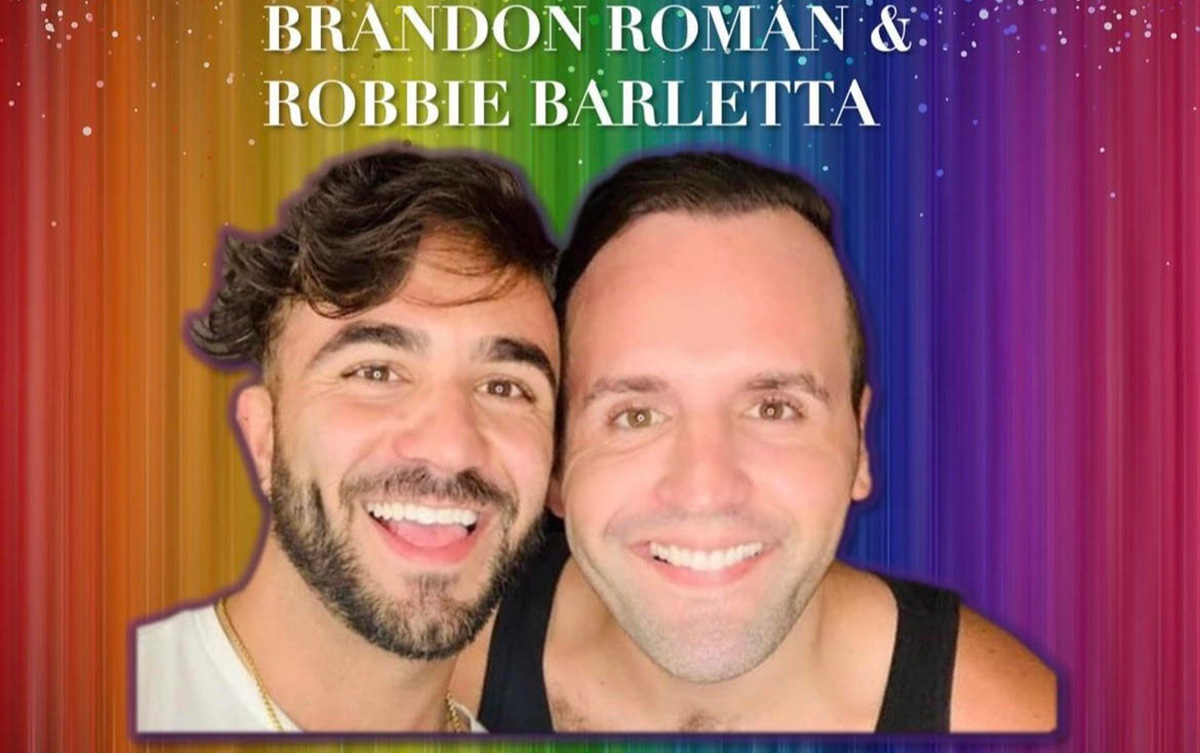
Sources familiar with D.C.’s LGBTQ nightlife scene say widespread reports on social media of the sudden and unexpected deaths of two widely known and beloved gay men from an apparent accidental drug overdose on Dec. 27 at one of the men’s homes has triggered an outcry for the city and the community to become more aggressive in addressing the opioid overdose problem and how it is impacting the LGBTQ community.
D.C. police and Fire and Emergency Medical Services Department reports show that prominent D.C. attorney and LGBTQ rights supporter Brandon Roman, 38, and historic preservation expert and home renovation business owner Robert ‘Robbie’ Barletta, 28, were found unconscious when police and emergency medical personnel arrived at Barletta’s house on the afternoon of Dec. 27.
The reports show that Roman was declared deceased at the scene shortly after D.C. police and an ambulance arrived at the house in response to a 911 call. According to one of the reports, Barletta was taken to Washington Hospital Center where he died on Dec. 29.
Both men were regular patrons at popular D.C. gay bars, including the gay nightclub and dance bar Bunker and the recently opened gay bar and lounge Shakers.
“Come to Honor their Lives in Your Best Sparkles and Shimmers – Saturday, February 3rd 5-8pm at Shakers,” according to an announcement by Shakers posted on Instagram of a celebration of life for Roman and Barletta.
Johnny Bailey, community outreach coordinator for the LGBTQ supportive community services organization HIPS, said the widespread news of Roman and Barletta’s passing has prompted more interest and support for the overdose training sessions that HIPS and other groups have been organizing at D.C. nightlife venues, including bars and nightclubs.
Bailey noted that one of the training sessions is scheduled for Saturday, Jan. 27 at the D.C. gay bar Trade. He said the next one was scheduled for Monday, Jan. 29 at the Adams Morgan gay bar Pitchers. Among other things, facilitators at the trainings will be distributing the life-saving overdose antidote Narcan and testing kits for fentanyl, which experts say is the leading cause of drug overdose deaths when it appears in other drugs such as cocaine without the knowledge of users of those other drugs.
According to Bailey, the gay bar JR.’s on 17th Street near Dupont Circle has hosted a table set up by HIPS to distribute Narcan, fentanyl test strips, and condoms on nights when the bar holds its popular drag shows.
Bailey said he did not know Roman and Barletta personally but people he works with at HIPS knew them and, according to his sources in the community, people who knew the two men believe their apparent overdose was caused by taking some other drug contaminated with fentanyl.
“It’s horrible when it takes a tragedy for things to come together,” Bailey told the Washington Blade. “But this tragedy has truly triggered a powerful response. It was a real wakeup call to a lot of people,” he said. “So, this happening to them really triggered something.”
Among other things, Bailey said, it has heightened interest in the training sessions at bars and other nightlife venues and prompted HIPS and other organizations to increase the number of the trainings.
David Perruzza, owner of Pitchers, said he was happy to host the training session at his bar on Jan. 29. He said he was among the business owners and community members to urge D.C. Mayor Muriel Bowser’s Office of LGBTQ Affairs to become involved in boosting overdose prevention efforts “because I was sick of people dying.”
Bailey and Jennifer Loken, interim director of Therapy and Substance Use Treatment at D.C.’s Whitman-Walker Health, each said it was difficult to determine exactly how many LGBTQ people in the city have survived or died from a drug overdose because the city doesn’t specifically count or keep track of overdose cases based on a person’s sexual orientation or gender identity.
The D.C. Office of the Chief Medical Examiner, which investigates and gathers data on D.C. drug overdose cases, breaks down its demographic data by race-ethnicity, gender, age, and jurisdiction of residence by city ward. In its most recent report, the medical examiner’s office says it has investigated 2,134 deaths due to the use of opioids from Jan. 1, 2017, through Feb. 28, 2023. In those years, the number of overdose deaths increased each year except for 2018, when there was a small decrease, followed by an increase in 2019 with a sharp increase in 2022 and 2023.
In 2022, the most recent year in which the full year data was tabulated, the report says there were 458 overdose deaths, with an average of 38 deaths per month.
“Overall, 1,807 or 84 percent of all deaths due to opioid use were among Blacks” from January 2017 through May 2023, the report says. “Approximately 72 percent of all fatal opioid overdoses occur among adults between the ages of 40-69 years old,” with 30 percent of those deaths due to opioid use among people ages 50 to 59, the report states. And the report shows that fatal opioid overdoses are far more common among males than females. In 2023, 76 percent of the overdose deaths were among men and 24 percent among women, the report shows.
Asked if Whitman-Walker has a sense or estimate of whether LGBTQ overdose cases are increasing like they are in the overall D.C. population, Loken said, “I would say yes from what I hear anecdotally. Any overdose death is a significant loss.” She added, “So, I think in general, yes, the risk is increasing. Exactly to what degree I don’t know.”
Rodney Adams, general counsel and spokesperson for the Office of the Chief Medical Examiner, said it would be difficult for the office to attempt to keep track of overdose deaths based on a person’s sexual orientation or gender identity for transgender people. Among other things, the sexual orientation or gender identity of a deceased person taken to the medical examiner’s facility for an autopsy and toxicology tests to determine the cause and manner of death would be difficult to determine, Adams said.
“I don’t think we can go out and question the next of kin of what they think their loved one identified as,” Adams told the Blade. “We have a difficult enough conversation with families when we tell them that their loved one is deceased.”
Loken of Whitman-Walker said Whitman-Walker has several programs and services for those who use drugs, including providing medication to help people who may want to stop using an opioid drug as well as harm reduction programs to help someone who wishes to continue using a drug to do so in the safest possible way.
“Sometimes there’s a lot of stigma around substance use in general,” Loken said. “And we definitely don’t want anyone to feel shameful or that they can’t ask for what they need.” All of Whitman-Walker’s substance use treatment or support programs are nonjudgmental toward those who are substance users, Loken told the Blade.
Bailey said one potential problem HIPS has encountered in organizing overdose training sessions at bars and other nightlife businesses is some of the businesses declined to host a training session because they were concerned the city’s Alcoholic Beverage and Cannabis Administration (ABCA), which regulates the sale of alcoholic beverages in the city, might penalize them for appearing to encourage drug use. Bailey said owners at some bars said they were afraid ABCA might take steps to revoke their liquor license if they hosted an overdose training session in which Narcan and drug testing kits were distributed
Jarred Powell, ABCA’s chief of staff, in response to an inquiry from the Blade, said ABCA would not penalize businesses for hosting such a training.
“ABCA is strongly supportive of alcohol licensed businesses encouraging their staff to become trained in opioid overdose prevention and naloxone administration and for businesses to have naloxone on hand to administer if any opioid overdose occurs,” Powell said in a statement to the Blade. Naloxone is the generic name for the overdose treatment medication Narcan.
“Additionally, ABCA supports businesses posting and distributing overdose prevention and treatment resources such as posters and brochures,” Powell said. “All are critically important components to D.C.’s harm reduction approach to substance abuse.”
Powell said ABCA is also collaborating with the D.C. Department of Behavioral Health, which oversees the city’s overdose prevention programs, and the Mayor’s Office of Nightlife and Culture and Office of LGBTQ Affairs to increase the city’s overdose prevention initiatives and to co-host Narcan administration trainings.
Japer Bowles, director of the Mayor’s Office of LGBTQ Affairs, issued an announcement on Dec. 31 praising HIPS, the city’s Department of Behavioral Health, and the LGBTQ supportive Capital Ballroom Council for making sure “every LGBTQIA nightlife establishment in D.C.” had Narcan in time for their New Year’s Eve celebrations.
Bailey, meanwhile, said he and other HIPS staff members will continue the work they started in the recent past to organize overdose prevention trainings.
“We go anywhere in the community,” he said. “I’ve done libraries, bars. I did a church one day and the Sisters of Perpetual Indulgence the next day,” he said, referring to the group that performs in drag dressed as nuns. “Any and all sorts of places we do these Narcan trainings.”
District of Columbia
Faith programming remains key part of Creating Change Conference
‘Faith work is not an easy pill to swallow in LGBTQ spaces’
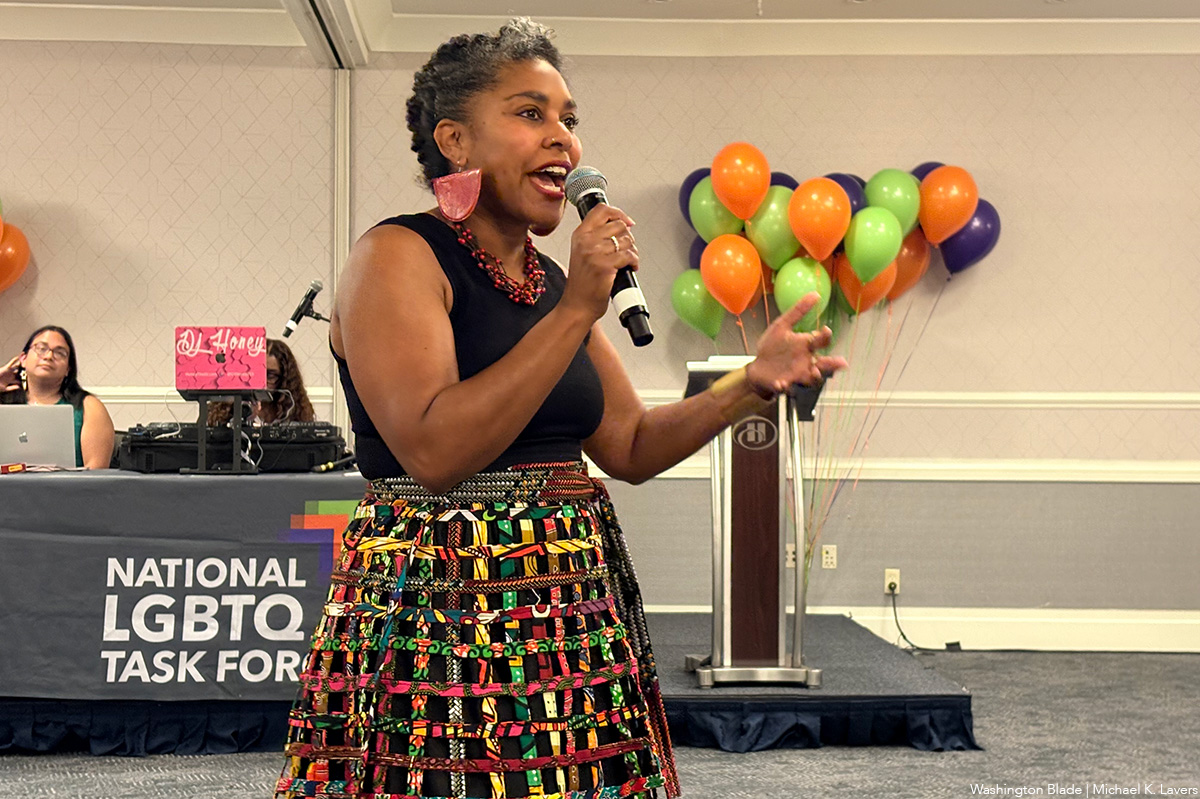
The National LGBTQ Task Force kicked off the 38th annual Creating Change conference in D.C. this week. This year, as with years past, faith and interfaith programming remains a key part of the conference’s mission and practice.
For some, the presence of faith work at an LGBTQ+ conference may seem antithetical, and Creating Change does not deny the history of harm caused by religious institutions. “We have to be clear that faith work is not an easy pill to swallow in LGBTQ spaces, and they’re no qualms about saying that we acknowledge the pain, trauma, and violence that’s been purported in the name of religion,” Tahil Sharma, Faith Work Director for the National LGBTQ Task Force, said.
In fact, several panels at the conference openly discuss acknowledging, healing from, and resisting religious harm as well as religious nationalism, including one scheduled today titled “Defending Democracy Through Religious Activism: A panel of experts on effective strategies for faith and multi-faith organizing” that features local queer faith activists like Ebony C. Peace, Rob Keithan, and Eric Eldritch who are also involved in the annual DC Pride Interfaith Service.
Another session will hold space for survivors of religious violence, creating “a drop-in space for loving on each other in healing ways, held by Rev. Alba Onofrio and Teo Drake.”
But Sharma and others who organized the Creating Change Conference explained that “a state of antipathy” towards religious communities, especially those that align with queer liberation and solidarity, is counterproductive and denies the rich history of queer religious activism. “It’s time for us to make a call for an approach to LGBTQ+ liberation that uses interfaith literacy as a tool rather than as a weapon against us,” Sharma explained.
Recognizing a local queer faith icon
Along with the panels, fighting religious nationalism and fostering communion with aligned faith activists and communities is at heart of this year’s faith work. As Sharma shared, “the person that we’re honoring this year for the faith award is Rev. Dr. Sofía Betancourt, and Dr. Betancourt is an amazing leader and someone who really stands out in representing UUs but also representing herself unapologetically.”
Based in the Washington, D.C. area, Dr. Betancourt has more than 20 years of experience working as a public minister, seminary professor, scholar, and environment ethicist, and public theologian. Her activism is rooted in her lived identities as a queer, multiracial, AfroLatine first-generation daughter of immigrants from Chile and Panama, and has been a critical voice in advancing the United Universalism towards anti-racist and pluralistic faith work.
Creating a faith-based gathering space
Sharma also said that faith fosters a unique space and practice to encounter grief and joy. For this reason, Sharma wants to “create a space for folks to engage in curiosity, to engage in spiritual fulfillment and grounding but also I think with the times that we’re in to lean into some space to mourn, some space to find hope.” The Many Paths Gathering Space serves this purpose, where visitors can stop for spiritual practice, speak with a Spiritual Care Team member, or just take a sensory break from the bustle of the conference.
This also means uplifting and foregrounding queer religious ephemera with an ofrenda to honor those who have passed, a display of nonbinary Korean American photographer Salgu Wissmath’s exhibition Divine Identity, and the Shower of Stoles, a collection of about 1,500 liturgical stoles and other sacred regalia representing the lives of lesbian, gay, bisexual, and transgender people of faith.
The Shower of Stoles
The collection was first started in 1995 by Martha Juillerat and Tammy Lindahl who received eighty stoles that accompanied them and lent them solace as they set aside their ordinations from the Presbyterian Church. The whole collection was first displayed at the 1996 General Assembly of the Presbyterian Church in New Mexico. The stoles, according to the Task Force, “quickly became a powerful symbol of the huge loss to the church of gifted leadership.”
Each stole represents the story of a queer person who is active in the life and leadership of their faith community, often sent in by the people themselves but sometimes by a loved one in their honor. About one third of all the stoles are donated anonymously, and over three-quarters of the stoles donated by clergy and full-time church professionals are contributed anonymously.
The collection shows “not just the deep harm that has been caused that does not allow people to meet their vocation when they’re faith leaders, but it also speaks to how there have been queer and trans people in our [faith] communities since the beginning of our traditions, and they continue to serve in forms of leadership,” Sharma explained.
Explicit interfaith work
Along with creating a sacred space for attendees, hosting workshops focused on faith-based action, and recognizing DC’s rich queer religious history, Creating Change is also hosting explicitly faith services, like a Buddhist Meditation, Catholic Mass, Shabbat service, Jummah Prayer Service, and an ecumenical Christian service on Sunday. Creating Change is also welcoming events at the heart of queer religious affirmation, including a Name/Gender/Pronoun/Identity Blessing Ritual and a reading and discussion around queer bibles stories with Rev. Sex (aka Rev. Alba Onofrio).
But along with specific faith-based programs, Sharma explained, “we’re looking to build on something that I helped to introduce, which was the separation of the interfaith ceremony that’s happening this year which is a vigil versus the ecumenical Christian service which is now the only thing that takes place on Sunday morning.”
This includes an Interfaith Empowerment Service this evening and an Interfaith Institute tomorrow, along with “Sing In the Revolution,” an event where folks are invited “to actually engage in the joy and rhythm of resolution and what that looks like,” Sharma said. One of the key activators behind this work is Rev. Eric Eldritch, an ordained Pagan clergy person with Circle Sanctuary and a member of the Pride Interfaith Service planning committee.
Affirming that queer faith work is part of liberation
The goal for this year, Sharma noted, alongside holding space and discussions about faith-based practice and liberation and intentional interfaith work–is to move from thinking about why faith matters in queer liberation spaces to “how is interfaith work the tool for how we’re engaging in our understanding of de-escalation work, digital strategies, navigating a deeper visioning that we need for a better world that requires us to think that we’re not alone in the struggle for mutual abundance and liberation,” Sharma explained.
It may surprise people to learn that faith work has intentionally been part of the National LGBTQ+ Task Force since its beginning in the 1980s. “We can really credit that to some of the former leadership like Urvashi Vaid who actually had a sense of understanding of what role faith plays in the work of liberation and justice,” Sharma said.
“For being someone who wasn’t necessarily religious, she certainly did have a clear understanding of the relationship between those folks who are allies, those folks who stand against us, and then those folks who sit in between–those folks who profess to be of religious and spiritual background and also are unapologetically LGBTQ+,” he continued.
This year’s faith programming builds on this rich history, thinking about “a way to kind of open doors, to not just invite people in but our people to go out into the general scene of the conference” to share how faith-based work is a tool, rather than a hindrance, to queer liberation work.
District of Columbia
Sold-out crowd turns out for 10th annual Caps Pride night
Gay Men’s Chorus soloist sings National Anthem, draws cheers
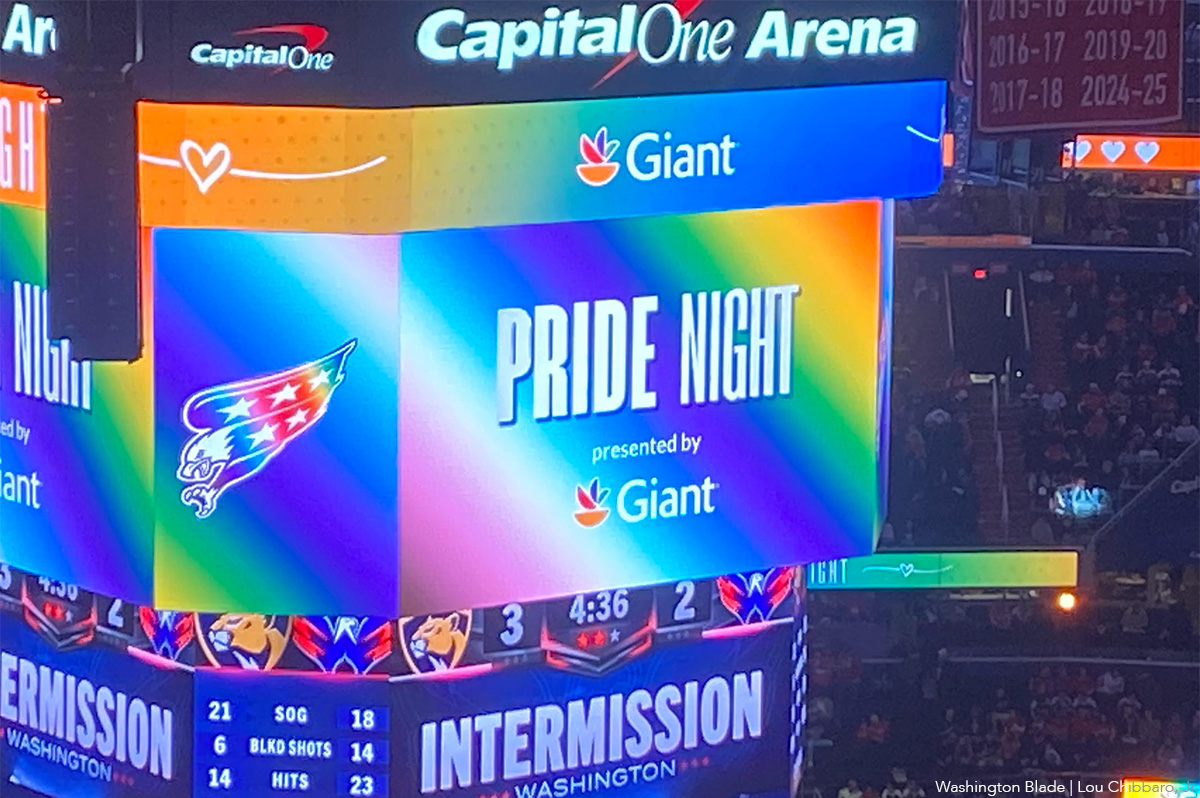
A sold-out crowd of 18,347 turned out on Jan. 17 for the 10th annual Pride Night at the Washington Capitals hockey game held at D.C.’s Capital One Arena.
Although LGBTQ Capitals fans were disappointed that the Capitals lost the game to the visiting Florida Panthers, they were treated to a night of celebration with Pride-related videos showing supportive Capitals players and fans projected on the arena’s giant video screen throughout the game.
The game began when Dana Nearing, a member of the Gay Men’s Chorus of Washington, sang the National Anthem, drawing applause from all attendees.
The event also served as a fundraiser for the LGBTQ groups Wanda Alston Foundation, which provides housing services to homeless LGBTQ youth, and You Can Play, a nonprofit organization dedicated to advancing LGBTQ inclusion in sports.
“Amid the queer community’s growing love affair with hockey, I’m incredibly honored and proud to see our hometown Capitals continue to celebrate queer joy in such a visible and meaningful way,” said Alston Foundation Executive Director Cesar Toledo.
Capitals spokesperson Nick Grossman said a fundraising raffle held during the game raised $14,760 for You Can Play. He said a fundraising auction for the Alston Foundation organized by the Capitals and its related Monumental Sports and Entertainment Foundation would continue until Thursday, Jan. 22
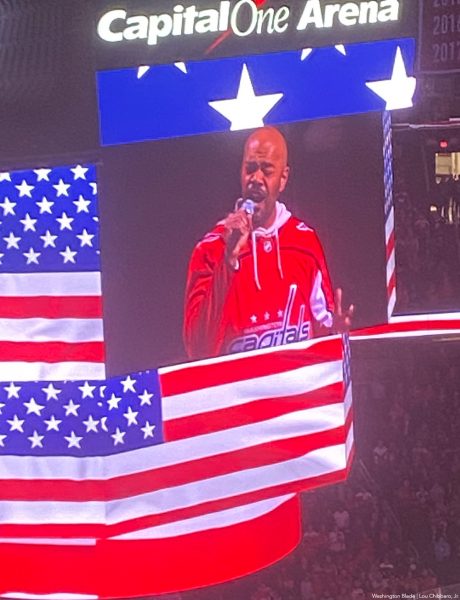
A statement on the Capitals website says among the items being sold in the auction were autographed Capitals player hockey sticks with rainbow-colored Pride tape wrapped around them, which Capitals players used in their pre-game practice on the ice.
Although several hundred people turned out for a pre-game Pride “block party” at the District E restaurant and bar located next to the Capital One Arena, it couldn’t immediately be determined how many Pride night special tickets for the game were sold.
“While we don’t disclose specific figures related to special ticket offers, we were proud to host our 10th Pride night and celebrate the LGBTQ+ community,” Capitals spokesperson Grossman told the Washington Blade.
District of Columbia
D.C.’s annual MLK Peace Walk and Parade set for Jan. 19
LGBTQ participants expected to join mayor’s contingent
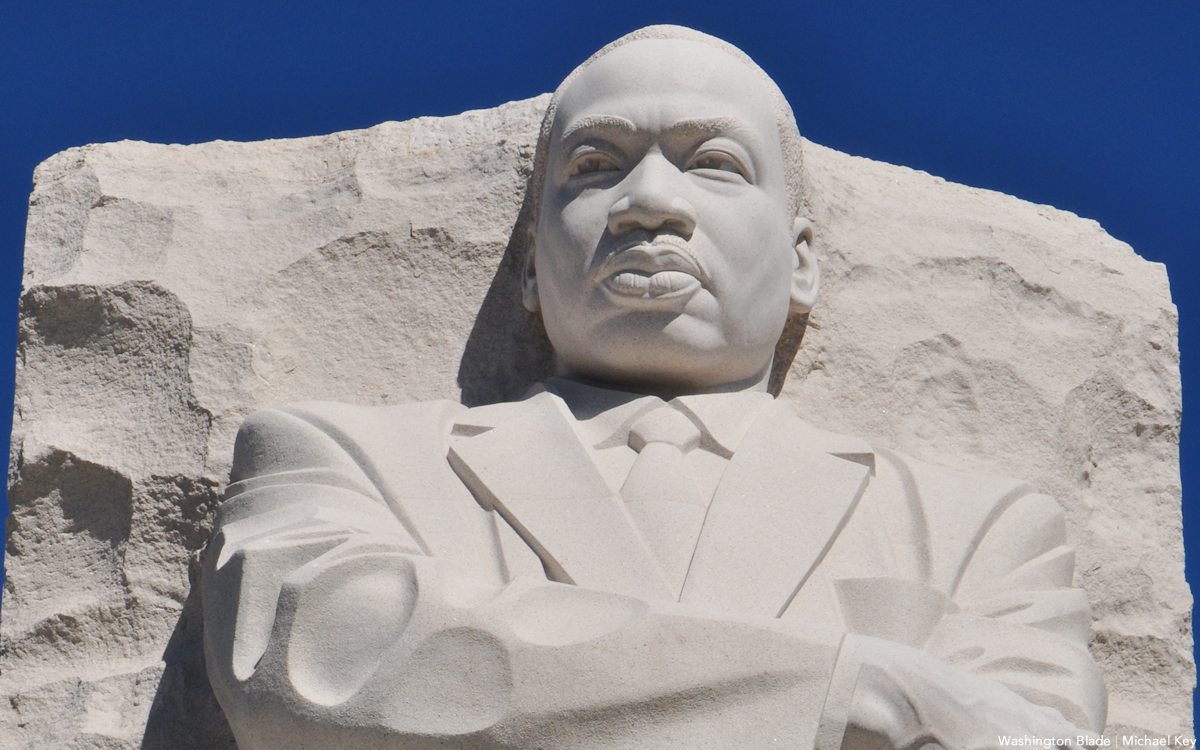
Similar to past years, members of the LGBTQ community were expected to participate in D.C.’s 21st annual Martin Luther King Jr. Day Peace Walk and Parade scheduled to take place Monday, Jan. 19.
Organizers announced this year’s Peace Walk, which takes place ahead of the parade, was scheduled to begin at 10:30 a.m. at the site of a Peace Rally set to begin at 9:30 a.m. at the intersection of Firth Sterling Avenue and Sumner Road, S.E., a short distance from Martin Luther King Jr. Avenue.
The Peace Walk and the parade, which is scheduled to begin at 11 a.m. at the same location, will each travel along Martin Luther King Jr. Avenue a little over a half mile to Marion Barry Avenue near the 11th Street Bridge where they will end.
Japer Bowles, director of D.C. Mayor Muriel Bowser’s Office of LGBTQ Affairs, said he and members of his staff would be marching in the parade as part of the mayor’s parade contingent. In past years, LGBTQ community members have also joined the mayor’s parade contingent.
Stuart Anderson, one of the MLK Day parade organizers, said he was not aware of any specific LGBTQ organizations that had signed up as a parade contingent for this year’s parade. LGBTQ group contingents have joined the parade in past years.
Denise Rolark Barnes, one of the lead D.C. MLK Day event organizers, said LGBTQ participants often join parade contingents associated with other organizations.
Barnes said a Health and Wellness Fair was scheduled to take place on the day of the parade along the parade route in a PNC Bank parking lot at 2031 Martin Luther King Jr. Ave., S.E.
A statement on the D.C. MLK Day website describes the parade’s history and impact on the community.
“Established to honor the life and legacy of Rev. Dr. Martin Luther King, Jr., the parade united residents of Ward 8, the District, and the entire region in the national movement to make Dr. King’s birthday a federal holiday,” the statement says. “Today, the parade not only celebrates its historic roots but also promotes peace and non-violence, spotlights organizations that serve the community, and showcases the talent and pride of school-aged children performing for family, friends, and community members.”
-

 Real Estate5 days ago
Real Estate5 days agoTop buyer-friendly markets for the LGBTQ community
-

 Virginia5 days ago
Virginia5 days agoAbigail Spanberger sworn in as Va. governor
-

 Autos4 days ago
Autos4 days agoHot rod heaven: Chevy Corvette, Dodge Charger
-

 Virginia4 days ago
Virginia4 days agoTwo gay candidates running in ‘firehouse’ Va. House of Delegates primary in Alexandria




















